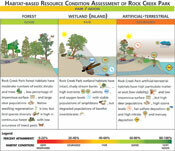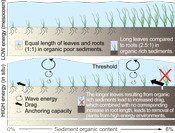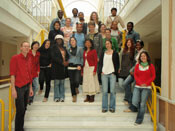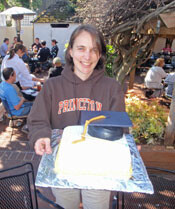George Wright Society meeting in Portland, Oregon.
 Bill Dennison and Tim Carruthers attended the George Wright Society conference in Portland, Oregon. Along with Shawn Carter, a National Park Service partner, they ran a "Communicating Science Effectively" workshop. There are a growing number of Science Communicators at the National Park Service and many of them attended the workshop. In addition, Tim Carruthers presented the recently completed Natural Resource Condition Assessment of Rock Creek Park which stimulated much discussion. Ken Burns and Dayton Duncan, historians and documentary producers, presented previews of a spectacular public television series on the history of national parks which will air in September 2009.
Bill Dennison and Tim Carruthers attended the George Wright Society conference in Portland, Oregon. Along with Shawn Carter, a National Park Service partner, they ran a "Communicating Science Effectively" workshop. There are a growing number of Science Communicators at the National Park Service and many of them attended the workshop. In addition, Tim Carruthers presented the recently completed Natural Resource Condition Assessment of Rock Creek Park which stimulated much discussion. Ken Burns and Dayton Duncan, historians and documentary producers, presented previews of a spectacular public television series on the history of national parks which will air in September 2009.
Sediment organic content, hydrodynamics, and seagrasses
 Caroline Wicks, from EcoCheck, was first author on a paper published in Marine Ecology Progress Series (378: 71-80), describing the effects of sediment organic content on seagrass growth and distribution in Chincoteague Bay, Maryland. When organic-rich sediments are found in hydrodynamically active areas, a mismatch occurs between plant morphology and the physical environment, leading to the loss of seagrasses due to uprooting. Therefore, sediment organic content limitations in seagrass habitats need to be evaluated within the local hydrodynamic settings. Fine organic sediment may be less limiting to seagrasses in quiescent waters while sand with low organic content may be required for seagrass survival in hydrodynamically active areas.
Caroline Wicks, from EcoCheck, was first author on a paper published in Marine Ecology Progress Series (378: 71-80), describing the effects of sediment organic content on seagrass growth and distribution in Chincoteague Bay, Maryland. When organic-rich sediments are found in hydrodynamically active areas, a mismatch occurs between plant morphology and the physical environment, leading to the loss of seagrasses due to uprooting. Therefore, sediment organic content limitations in seagrass habitats need to be evaluated within the local hydrodynamic settings. Fine organic sediment may be less limiting to seagrasses in quiescent waters while sand with low organic content may be required for seagrass survival in hydrodynamically active areas.
Teaching science communication to Erasmus Mundus students.
 Erasmus Mundus is a European Union-funded MS program for students from around the globe. Students spend a semester in Plymouth, UK, a semester in Cadiz, Spain, and then a final semester doing a research project. The program has lecturers from around the globe who give a broad-based understanding of global resource and water management issues. In the first week of April, IAN's Tim Carruthers traveled to Cadiz, Spain, to present a module on Effective Science Communication.
Erasmus Mundus is a European Union-funded MS program for students from around the globe. Students spend a semester in Plymouth, UK, a semester in Cadiz, Spain, and then a final semester doing a research project. The program has lecturers from around the globe who give a broad-based understanding of global resource and water management issues. In the first week of April, IAN's Tim Carruthers traveled to Cadiz, Spain, to present a module on Effective Science Communication.
Jeni Keisman, PhD
 Jeni Keisman successfully defended her PhD dissertation at the Department of Ecology and Evolutionary Biology, Princeton University on April 10. Jeni's thesis was titled "Species effects on nutrient cycling in forests: A study of leaf litter's role in shaping soil microbial communities and nutrient recycling". In her current position as a Water Quality Analyst at the Chesapeake Bay Program, Jeni worked part-time to finish her dissertation with her thesis advisor Dr. Lars Hedin from Princeton, with access to Jess Parker and Pat Megonigal's labs at the Smithsonian Environmental Research Center. Jeni has now begun working at the Chesapeake Bay Program full-time and looks forward to simplifying her life.
Jeni Keisman successfully defended her PhD dissertation at the Department of Ecology and Evolutionary Biology, Princeton University on April 10. Jeni's thesis was titled "Species effects on nutrient cycling in forests: A study of leaf litter's role in shaping soil microbial communities and nutrient recycling". In her current position as a Water Quality Analyst at the Chesapeake Bay Program, Jeni worked part-time to finish her dissertation with her thesis advisor Dr. Lars Hedin from Princeton, with access to Jess Parker and Pat Megonigal's labs at the Smithsonian Environmental Research Center. Jeni has now begun working at the Chesapeake Bay Program full-time and looks forward to simplifying her life.

